Text
CHINESE SLANG & ABBREVIATIONS
**Large part of this list is thanks to @/caerium on twitter for posting some common slang & terms used by Chinese netizens. For a link to their twitter, click here.
+ no pinyin sorry… i thought it might be too confusing
LOVE
cp: couple / ship
tla: dating (谈恋爱)
zqsg: true love (真情实感)
同志: gay person (lit. comrade)
xql: sweethearts (小情侣)
cdx: getting a boyfriend / girlfriend
FANDOM / SOCIAL MEDIA
up / dd / 顶: bump
lz: op (original poster) (楼主)
bp: fans who don’t spend money (白嫖)
pyq: wechat “friend’s circle” or “moments” where you share pictures or posts (朋友圈)
腐女:girls who like bl (boy love) things (lit. rotten woman)
磕: ship it / like it
车: smut (sometimes indicated by a car emoji 🚗)(lit. car)
mz: liking a post in a millisecond (秒赞)
ch: supertopic (超话) (weibo)
sj: someone is secretly following someone else’s weibo / hot topic / etc (视奸)
TERMS OF ADDRESS
jmm / xjm / xjj / xgg: 姐妹们 / 小姐们 / 小姐姐 / 小哥哥 cutesy honorific titles for men & women around the same age as you (lit . older / younger / little sister or brother) (use respectively: 姐: older sister 妹: younger sister 哥: older brother)
宝宝 / 宝贝: baby
公举: princess
老铁: bro, homie
p: photoshop / femme lesbian (stands for pretty /婆 wife)
t: butch lesbian (stands for tomboy / 铁 iron or 老铁 bro)
NUMBERS
666: awesome
555: crying noise boo hoo (呜呜呜)
(5)14: (I) want death (我)要死
no I / 我 = no 5
914: almost dead (就要死)
56: bored (无聊)
5366: I want to chat (我想聊聊)
995: save me (救救我)
520: I love you (我爱你)
918: jiayou 加油吧 (form of encouragement: come on! you can do it! fighting) (lit. add oil)
246: starving (饿死了)
0487: you are an idiot (你是白痴)
36: bitch
250: idiot
530: I miss you (我想你)
88: bye bye (拜拜)
INSULTS
绿茶婊: girl who pretends to be innocent but is really pretentious; basic bitch (lit. green tea bitch)
卖萌: pretending to be cute
土: basic (lit. dirt)
二货: idiot
xxj: childish person (小学鸡)
装b: cocky, pretending to be something you’re not (my dictionary says pretentious prick haha)
sjb: crazy person (神经病)
REALLY / “TO DEATH”
rxl: heart is really tired (really心累)
rsx: really broken hearted (really份心)
xsml: super envious (羡慕死了) (lit. envious to death)
rnb: really awesome or impressive (really牛b)
tcl: really unfortunate (太惨了)
qswl: really mad (气���我了)(lit. mad to death)
xs(w)l: lmao (lit. laugh to death) (笑死(我)了)
no 我 = no “w”
ETC
dbq: sorry (对不起)
dbqdrl: sorry i am intruding (on something) (对不起打扰了)
bhys: sorry (不好意思)
sk: happy birthday (生快 / 生日快乐)
bml: don’t speak bad of / don’t make fun of (别骂了)
wsl: I died (我死了)
bzd: don’t know (不知道)
ky: saying nonsense (胡说)
nbcs: nobody cares
瓜: gossip
算了: forget it (something is impossible… used in break ups sometimes too)
没门儿: no way, not a chance
什么鬼: what the heck
szd: it is real (是真的)
nsdd: you’re right (你说的对)
ttl: too sweet (太甜了)
可: ok / agree
無 / 无: none / no one
锺 / 石锺: proven
没毛病: no problem
萌: cute
酷: cool
feel free to add on it let me know if I made any mistakes!!
1K notes
·
View notes
Text

Vincent van Gogh To Theo van Gogh. Ramsgate, Wednesday, 31 May 1876.
“When Van Gogh was a young man in his early twenties, he was in London studying to be a clergyman. He had no thought of being an artist at all. he sat in his cheap little room writing a letter to his younger brother in Holland, whom he loved very much. He looked out his window at a watery twilight, a thin lamppost, a star, and he said in his letter something like this: “it is so beautiful I must show you how it looks.” And then on his cheap ruled note paper, he made the most beautiful, tender, little drawing of it. When I read this letter of Van Gogh’s it comforted me very much and seemed to throw a clear light on the whole road of Art. Before, I thought that to produce a work of painting or literature, you scowled and thought long and ponderously and weighed everything solemnly and learned everything that all artists had ever done aforetime, and what their influences and schools were, and you were extremely careful about *design* and *balance* and getting *interesting planes* into your painting, and avoided, with the most astringent severity, showing the faintest *academical* tendency, and were strictly modern. And so on and so on. But the moment I read Van Gogh’s letter I knew what art was, and the creative impulse. It is a feeling of love and enthusiasm for something, and in a direct, simple, passionate and true way, you try to show this beauty in things to others, by drawing it. And Van Gogh’s little drawing on the cheap note paper was a work of art because he loved the sky and the frail lamppost against it so seriously that he made the drawing with the most exquisite conscientiousness and care.”
— Brenda Ueland, from “If You Want to Write: A Book about Art, Independence and Spirit”
136K notes
·
View notes
Text
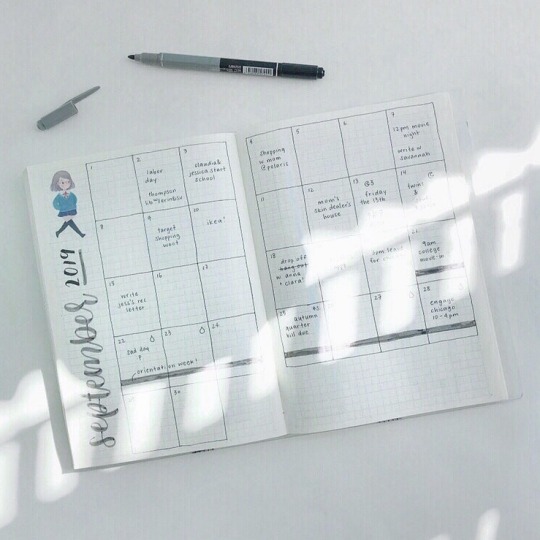

ig | @xguas
some semi-recent spreads from my first quarter at uni! i’m never active here anymore so follow me on ig :)
9 notes
·
View notes
Text


ig | @xguas
some semi-recent spreads from my first quarter at uni! i’m never active here anymore so follow me on ig :)
#studyblr#studyspo#studysthetics#studyinspo#bujo#bullet journal#stationary#washi tape#stickers#calligraphy#bujoblr#mine#mine: 1920#mine: bujo
9 notes
·
View notes
Text
how to do internship interviews
i know summer just started, but it’s because it’s summer that i had time to write this. have some (hopefully) helpful ideas about how to approach interviews.
before the interview: research the company. make sure you can talk intelligently about the things they do and why you too want to do those things. write down your answers to common interview questions. i actually keep a word doc with some questions and a few different possible answers. make sure you have some well thought out questions to ask the people who interview you (have more than one in case they cover the answer to one of them during the interview!)
some questions i’ve asked that were well received:
1. why do you like working at x company?
2. what would a typical day look like for me? (this is often covered during the interview, but if not you should definitely ask!)
3. what is the most important thing to do to be successful in this position?
4. (ask carefully and politely) do your interns often work here full time after graduation?
5. (definitely ask this one if you’re not explicitly given a timeline!) can you give me a timeline for the next steps?
during the interview: pretend you don’t care. don’t sleep the night before so you’re exhausted and don’t care about anything (probably you shouldn’t actually do this specifically, but for long distance travel reasons this has happened for every interview i’ve done). pretend you already have a better offer and this interview is just practice.
tell your impostor syndrome to fuck off. brag about yourself shamelessly. think about the most arrogant person you know. channel (a little bit of) them. for math majors especially, heavily push your problem solving skills. if you’ve done any cool projects in class or outside of class, now’s the time to talk about them. ask the questions you came up with.
after the interview: send a thank you email to the people who interviewed you. send it to hr/whoever you were in contact with if you don’t have contact information for the specific people who interviewed you. a week or two later, if you haven’t heard from them, follow up. (unless the timeline you get in the interview would make this a bad idea)
some things i didn’t know before my first interview and wish i had known:
- you should bring a copy of your resume for yourself and for interviewers. i was asked to walk an interviewer through my resume and they had a copy while i didn’t…oops, awkward.
- they might actually give you an offer then and there, especially for an internship with a smaller company. have a response in place.
150 notes
·
View notes
Text
how to deal with burnouts
if you’ve never experienced a burnout, you’re lucky. last year, these was a period of time when i went through a burnout, and truly, honestly - it was terrible and i hope to never feel as tired and hopeless as i did then. looking back on the last school year, i’ve made some changes to my lifestyle and habits in an effort to lower my chances of burning out, and i wanted to share them, so that you know you are not alone. it’s a long post, since i’m really passionate about this, so buckle up your seat belts or save it for when you need.
IF YOU:
feel constantly tired and defeated
are getting less and less sleep each night
cry in frustration while doing your school work
feel like you’re just acting happy for the ones you love
start to not care
feel like you’re physically getting sick
don’t feel like yourself
then you’re probably in the middle or about to be in the middle of a burnout
note: to me, a burnout is not simply a loss of motivation or a piling on of stress. a complete burnout is the feeling that you don’t want to try anymore and you are physically, as well as mentally, ready to give up.
Keep reading
227 notes
·
View notes
Text
Soft skills for the apocalypse
Let’s face it, if the world ends, so many of us will flee somewhere else for safety that we’ll end right back up in communities again. There’s going to be more to it than growing your own food and knitting handspun socks.
I’m linking to resources, but a many of these skills, being interpersonal, are best taught in live trainings by professional instructors, where you can see and feel all the interpersonal dynamics going on in the room, and by experience, trying them out on real people in an educational setting.
When the world ends, it will be helpful to be able to::
Run a meeting
Peacefully negotiate
De-escalate a potentially violent situation
Organize a community
Cope when you’re having a panic attack
Co-regulate to help a child keep calm
Identify community resources
Protest safely and peacefully
Even small local pieces of activism today, like organizing a protest march or lobbying your municipal government to make public spaces more accessible, have a double reward: There’s the work you’re doing, and the skills you learn when you do it.
24K notes
·
View notes
Photo

After a few years of trial and error, I think I’ve finally found the perfect organization method.
In the early years of high school, I had a bullet journal. I was an artsy kid who found a way to combine art with organization in a way that benefited other parts of my life.
However, as I approached the end of high school, my schedule got busier, and I was involved in a lot more things, so owning a bullet journal was less practical. Because of that, I switched to an app called Edo Agenda.
I continued with digital planning in college since I knew I wasn’t going to have as much time. But all the apps I tried out—Taskade, Actions by Moleskine, Any.do, Todoist, Wunderlist—weren’t suited to my planning and organizational needs. They didn’t have the specific functions I required and didn’t incorporate an organization system I liked to use. The predefined apps were too restraining, but the more customizable apps weren’t customizable enough.
So then I switched to a bare bones, uber minimalist bullet journal method. That worked pretty well my second semester. It was simple, portable, and most importantly, flexible—all the things one could wish for in a planning system. However, it wasn’t always the most convenient to use since I couldn’t effectively integrate all the different aspects of my life, which, to no surprise, is mostly recorded digitally.
There was just one huge problem with my digital organization system that made me hesitant to switch back in the first place: everything was fragmented. Notes were in Google Docs. Financial records were in Google Sheets. To-Do Lists were in my bullet journal. Team projects were in Trello. My poetry was on Bear. Things I wanted to try are carelessly pinned to random pinterest boards or added to my YouTube “watch later” playlist. It was a mess.
Over the summer, I found out about Notion from a friend, and I thought, this has so much potential, it could even be exactly what I need. It’s essentially like an empty notebook on your computer with functions that make it 10x more powerful. Notion allows you to integrate all aspects of your life and work into one app. Some of the advantages that have made me partial to Notion are:
Even greater customization level. Notion is a blank canvas with tons of predefined blocks and different file types. You can make databases, spreadsheets, Kanban boards, to do lists, etc. Also, you can remain connected to other digital services. You can link websites, collaborate with other users, use different structures (e.g. documents, databases, tasks), embed images and videos, etc. There are also tons of formatting options, e.g. text color, highlight, heading v. body text.
Better organization. Notion allows you to have pages within pages within pages within pages—an infinite hierarchy that you can organize with tables of contents. These pages are made of blocks, e.g. tables, checklists, boards, databases. Both pages and blocks can be rearranged by simply dragging and dropping them to where you want them to be. In other words, I guess it’s kind of like building a website to organize your life. Plus, their database feature is especially powerful as it allows you to connect all your data and get into as much detail as you wish (each entry in a database is its own page).
Templates. There are tons of templates created by both Notion and the community that you can use. These are especially helpful in the beginning since Notion does have a rather steep learning curve. There aretemplate for almost every category: personal, planning, finance, job applications, design roadmap, etc. Check out their template gallery, this medium article called “10 Notion templates to inspire your use”, or read on for my own examples!
Shortcuts. This makes typing and documenting so much faster. Notion uses Markdown, which is a text-to-HTML conversion tool, e.g. # = Heading 1, *, - = bullet point, etc.
Notion has some pretty awesome features, but how does one actually use it? Personally, I have four top-level pages: my planner, my personal journal, songwriting, and blogging.
Planner
I’ve been using my planner to, well, plan and track my day to day activities as well as my week and month. The way I’ve structured it is a calendar or monthly overview with links to pages of weekly overviews, and if needed, daily overviews within the weekly overview. This links things up so nicely, i.e. I don’t have to be constantly flipping pages in my physical bullet journal or planner to find what I need.
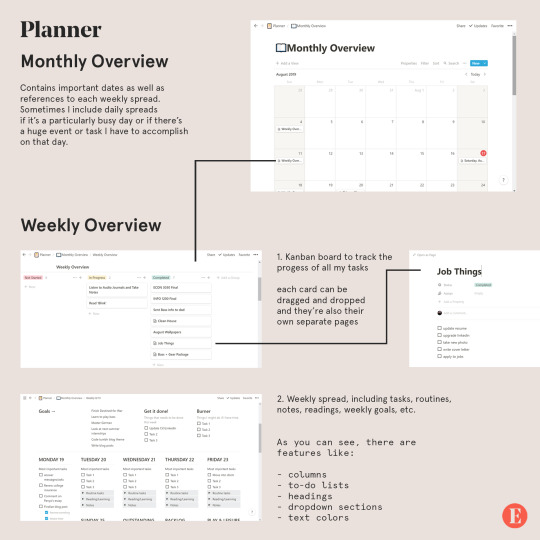
I also have entertainment lists, which is mainly a table with all the shows I want to watch, the books I want to read, etc. I keep track of whether or not I’ve watched them, as well as my personal ratings. What I love most about this is that each entry is its own page, so I can type my notes for each book, show, or film and easily find them in the future. (Also the reason why I have plural “lists” instead of just one entertainment list is because you can filter entries by type of entertainment, e.g. movies, tv shows, books, articles.)
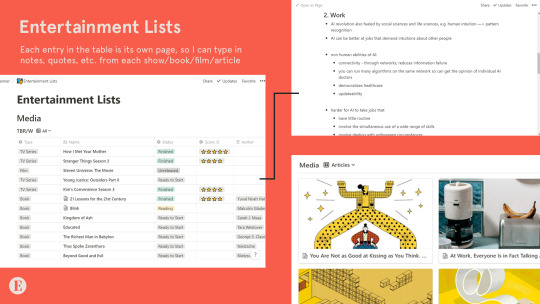
Personal
For personal notes, goals, journal entries, etc. This is kind of like an extension of my daily journal and just where I dump all my thoughts and keep track of the different aspects of my life: mental, emotional, spiritual, social, physical, and travel.
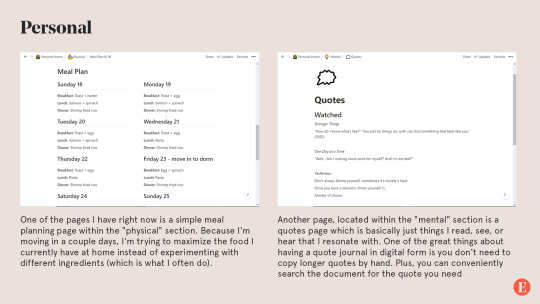
Another page I have is called “Stray Thoughts” and, well, it’s pretty self explanatory. It’s a lot easier to dump all my thoughts as they come and reorganize them later. Of course, this requires sacrificing the rawness of journaling, i.e. when the thoughts come and how you process them, which is why I still keep a regular journal that I write in daily.
Songwriting
I’ve been writing a lot of music over the summer and it’s often hard to keep track of all of my songs and how far I’ve gotten in the songwriting process. So I created a table of songs - each entry of a song is a page with its lyrics. These are then tagged with the status of the lyrics (i.e. completed, in progress) and the status of the music itself (i.e. melody only, instrumental, mixing, mastering, revised). Eventually, I’ll include demos in the database by embedding audio files in the document.
I have a separate section for inspiration and ideas, which is a kind of brain dump, e.g. words I think would make a good song, a certain theme for a song, a melody that’s been stuck in my head, a vibe I’d like to try out, etc.
I’ve also been watching a lot of tutorials for music production and there’s a section where I write my notes for that.
Eintsein
The last section of my Notion app is for this blog. Which has pages for
New posts. These are ideas for future posts, asks that I think would need longer answers, as well as posts that are currently in the draft stage (like this one was before I posted it)
Design assets. This is where I put all the visual branding material for Eintsein.com to be used in posts and any visual material on the blog.
FAQ. Having an FAQ document just makes it so much easier to make changes to your existing FAQ. Plus, if you ever change your FAQ theme, you just have to copy and paste what you already have.
Post directory. I keep track of all my previous masterposts, infographics, and generally longer and more comprehensive posts. It’s the exact same as what you see on my Navigation page. And yes, the document contains direct links to the post.
New theme. A project I’ve been working on the past couple days is trying to create my own theme for my blog. This is where I put all my outlines, brainstorming notes, design inspiration, code snippets, etc.There are some pretty awesome features I’ve made use of in this page:

As you can probably tell, I’m absolutely obsessed with Notion since it has such awesome features and endless possibilities for customization. So far I’ve been using Notion for personal projects, which, since they are quite big in scale and have no set deadline, are important to organize well. My summer courses were only 6 weeks and weren’t difficult to organize.
The formats above are just how I personally use notion. You could make some of your own, or if you don’t think you want to build your pages from scratch, there are tons of templates to choose from. Here are some I think I’ll be using in the near future and may be helpful for others as well, especially students like myself:
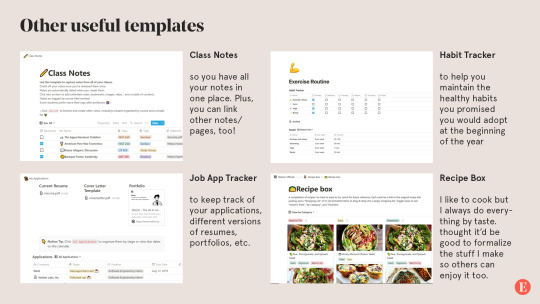
One drawback, however, is that Notion has a rather steep learning curve, but there are tons of tutorials online (especially YouTube) and I guarantee you it’s all worth it.
Notion is not just a productivity app. It’s a way to concretize your entire life.
Notion is free to use, but there are higher tiers that allow for more blocks, greater file size, etc. I use a personal account, which is $4 per month with unlimited block storage and no file upload limit (although I got it for $33/year). Personally I think the free plan would suit most people’s needs, especially if you’re not uploading large files.
5K notes
·
View notes
Text
everyday essentials for college
phone, keys, wallet, student id - the absolute essentials. keep them all in one place. also get a smallish wallet that you can put in your pocket. if you don’t carry cash and only have a couple cards, just get a card case.
a solid phone case and a card case that sticks to the back of it - this phone case is a kind that i highly recommend. it’s durable, tough, and you can stick a card case on it. as for card cases, university stores usually sell them, or you could get them on amazon, or even better, you could get them for free at orientation events.
a laptop and charger - you might not need a laptop for every single class, but everything’s online nowadays it’s a lot more convenient to have your own laptop to study and get work done rather than going back and forth from your dorm/apartment to the computer lab.
enough stationery - to be completely honest, not everyone is going to need stationery, especially if all your classes are for subjects in which it would be more efficient to have everything digital (e.g. most reading-based/humanities classes). but if you’re taking like math-based classes, you’d at least need 1 writing instrument, some paper/a notebook, and a calculator. everything else is (probably) luxury.
a planner (digital or paper) - you gotta keep track of your time one way or another. you don’t necessarily need to plan every day by the hour, but you should know the things you have to complete each day/week/month. i had a very simple bullet journal, which i’ve migrated to notionfor the upcoming year. google calendar’s also been pretty helpful during my freshman year, especially since you can sync your club calendars with your personal calendar.
power bank and phone charger - there are a lot of sockets on campus, but you’re going to be moving around a lot and you don’t wanna damage your phone battery by charging only 10% each time. i have one like this.
a good water bottle - at least something with the quality of a hydroflask/thermos. you’d be surprised at how much money you save just by having a water bottle instead of buying drinks from the vending machine each time you’re thirsty. there are usually water dispensers everywhere on campus, so you don’t necessarily need a huge ass 2L bottle, just something that’s portable, durable, and insulated.
a strong, windproof umbrella - i recommend this one from amazon; it’s saved my life so many times especially during the winter and spring when it precipitates almost every other day. any windproof golf umbrella would be great, i.e. with a double canopy and wide enough to make sure you don’t get wet or snowed/rained on.
lotion and lip balm - the vaseline petroleum jelly is unbeatable when it comes to keeping your skin and lips hydrated, especially in the dry winters. it’s good to apply it frequently so your skin doesn’t crack and you start bleeding.
medication - i carry a small pouch with medication for allergies, headaches, mild colds, and severe colds - these are the things i deal with most often. yours might be a little different, e.g. you might need one for stomach aches, fevers, etc. you never know when you might need them, but also be careful not to take them too often. i also carry halls cough drops or fisherman’s friend lozenges to help me breathe more easily or to soothe my throat. also a winter essential.
3K notes
·
View notes
Photo
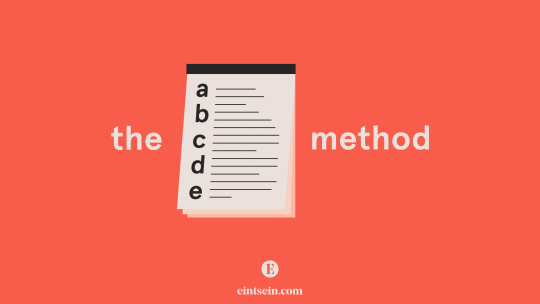


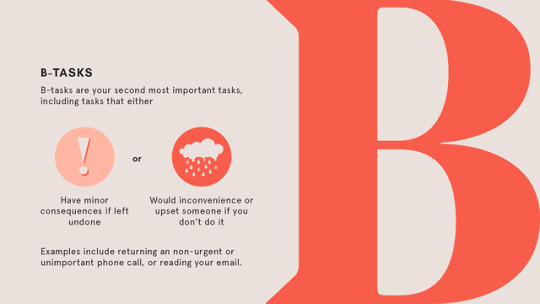

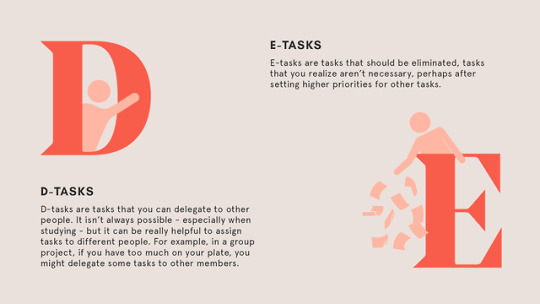

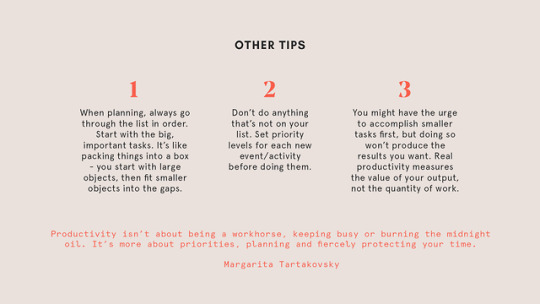

The ABCDE Method: Accomplish Tasks more Efficiently
I recently came across the ABCDE method that’s similar to what I do to stay productive each day: instead of lumping up all your tasks, sort them into categories and tackle each of them differently. Here’s an outline of the method. Hope it helps :)
16K notes
·
View notes
Photo
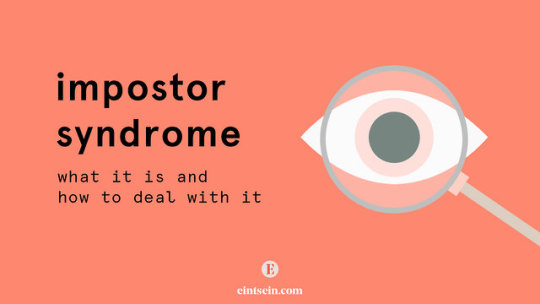
Impostor Syndrome: What it is and how to deal with it
There may be times when you feel like a fraud, like at any moment people will find out that you have no clue what you’re doing and you don’t deserve any of your achievements. You think that you’re unworthy of praise, that you only succeeded out of luck.
This is known as Impostor Syndrome, and around 70% of people have struggled with it in their lives. The problem arises when high achievers fail to internalize their success, i.e. when you attribute your success not to your own abilities but rather to external factors.
Some say that impostor syndrome could be linked to traits like anxiety or neuroticism. Impostor syndrome has also been commonly attributed to behavioral causes like childhood experiences, e.g. being labeled as “the smart one” or “the talented one”.
Another huge factor is how well you think you fit into a certain group, e.g. impostor syndrome is common among people of a racial/ethnic/cultural minority, women in STEM, and international students at US universities.
Dr. Pauline R. Clance was the first to design a scale to measure impostor syndrome based on six factors
The impostor cycle, where someone is given an achievement-related task and they either (a) overprepare or (b) procrastinate
The need to be special/the best
Superhuman characteristics
Fear of failure
Denial of ability and discounting praise
Feeling fear and guilt about success
There are different types of impostors, as categorized by Dr. Valerie Young, an expert on impostor syndrome (note that these categories aren’t mutually exclusive):
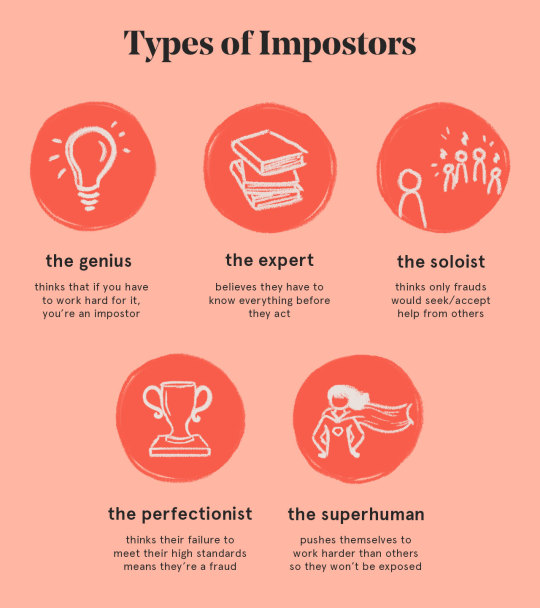
I’ve personally dealt with the first two types. I’m fairly certain I can attribute being ‘the genius’ to childhood/adolescent circumstance: I’ve been known as ‘the smart one’ throughout elementary school and high school - every time I made a mistake, it was met with a chorus of ‘wahh jo made a mistake…’ Even last month when I had a mini-reunion with some of my high school friends, one of them said something along the lines of “I like when Jo makes mistakes because it reminds me that she’s human, too.” I can definitely say I’ve overcome that now because, you know, college - everyone’s as smart or smarter than you and works pretty hard.
Being ‘the expert’ is still something I’m still trying to overcome. Last spring when I was applying to internships, I only dared to apply to those where I met 100% of the requirements. I’ve been coding for like 4 years but I constantly think I’m incompetent. It once got up to the point where I literally took 3 similar courses to assure myself that I actually do know how to do full-stack web programming. I still struggle to draw the line between relearning something because I don’t think I really know it, versus learning something for the expansion of knowledge.
How do I deal with it?
Firstly acknowledge that you have impostor-related thoughts Awareness is the first step to changing how you think and how you act.
How does impostor syndrome look like in a school/college setting? Examples include
You refrain from asking questions because you think other students/TAs/the professor will think you’re dumb;
You don’t respond to questions even though you kind of know the answer but you always think your answers aren’t right enough or that they’re simply wrong;
You don’t participate in discussions because you feel that you won’t add any value; or
You prevent yourself from having an opinion because you feel like you have no right to have one.
Reframe your thoughts
Think of their possible effects Do these thoughts help or hinder me? Will anything useful come out of thinking this? Acknowledge that not speaking up may mean slowing your team down or depriving your classmates of potentially valuable insights.
Separate fact from feeling Are they factual or simply a misinterpretation of my environment?
Differentiate feelings of fraudulence from feeling like an outsider Does my work show that I’m incompetent or is the fact that I’m the only female in a team of males/POC in a team of Caucasians make me think I’m inferior?
Stop comparing yourself to other people You might think something along the lines of “there are already so many people who can do what I do but so much better, so what’s the point in even trying?” However, remember that these people were once where you were, and taking even the smallest of actions could help you get to where they are.
Be more forgiving with yourself
Rethink perfection Not everything has to be perfect. Even if you have high standards, not achieving those standards doesn’t make you any less worthy.
Reframe mistakes and identify areas of improvement It’s okay to be wrong or not to know everything. Think of mistakes as learning opportunities and indicators of gaps in your knowledge/understanding of something, as opposed to a negative measure of your self-worth. Being wrong doesn’t mean you’re fake; it just means you have more to learn.
For example, previously I would only answer a question in class if I was at least 90% sure that was the correct answer. That’s a high threshold, and I don’t think it’s very useful for helping me learn and grow. Over the course of a year, I’ve managed to lower that down to I’d say around 60% (50% with coffee lmao).
Collect positive experience
Remember and reflect on praises Think about the efforts you exerted to help you achieve something and the positive responses you garnered when you finally achieved it. Remind yourself of the words of encouragement other people have told you, no matter how small. You could even keep a folder/document/journal to look back on when you feel like a fraud.
Heck, sometimes I feel like my posts aren’t useful or my designs are terrible, but then you guys tell me such kind things and I think, maybe I’m not as bad as I thought.
However, while it’s good to remember the good words people have said, don’t work just for the sake of praise. Focus on the value of the work itself and not the validation that comes from it.
Focus on providing value
Focus on what you can say Instead of thinking about what you don’t know, focus on what you do know and what you can say. Even if what you say isn’t entirely correct or relevant, it’ll get others around you thinking.
Remind yourself that holding back is like robbing the world of your ideas There’s always some value in your words, even if you don’t initially think so. How that value affects the world or other people may differ. For example, when you put forward an idea/thought in a discussion, it could be that
If there were parts that were incorrect, other people might have had the same misconception and are more than happy for the clarification;
Again, if there were parts that weren’t correct, they might not have had the same misconception but now realize that there is a way in which the subject can be misinterpreted, thus allowing them to have a more comprehensive understanding of the subject; and/or
It’ll stimulate further thinking and discussion and raise more questions, especially if other people wouldn’t normally think what you just thought. Then other people could bounce off your idea and form an equally great one.
Take action You won’t feel as much of a fraud if you’re doing something that brings you a little closer to achieving your goals or that adds value to your work.
However, be careful not to overwork yourself. Every time you start doing something, pause and think: is this really important to my progress or am I just trying to prove myself?
Instead of working on too many things, do something outside your comfort zone each day no matter how small. Once you do this, focus on quality (your growth) instead of quantity (the number of things you do).
Also, for those of you who fall into the ‘expert’ category, this also means practicing just-in-time learning, i.e. learning things when you need it, not just to comfort yourself.

I hope that was helpful, and please don’t hesitate to reach out if you have any questions/comments/suggestions :)
9K notes
·
View notes
Photo

Impostor Syndrome: What it is and how to deal with it
There may be times when you feel like a fraud, like at any moment people will find out that you have no clue what you’re doing and you don’t deserve any of your achievements. You think that you’re unworthy of praise, that you only succeeded out of luck.
This is known as Impostor Syndrome, and around 70% of people have struggled with it in their lives. The problem arises when high achievers fail to internalize their success, i.e. when you attribute your success not to your own abilities but rather to external factors.
Some say that impostor syndrome could be linked to traits like anxiety or neuroticism. Impostor syndrome has also been commonly attributed to behavioral causes like childhood experiences, e.g. being labeled as “the smart one” or “the talented one”.
Another huge factor is how well you think you fit into a certain group, e.g. impostor syndrome is common among people of a racial/ethnic/cultural minority, women in STEM, and international students at US universities.
Dr. Pauline R. Clance was the first to design a scale to measure impostor syndrome based on six factors
The impostor cycle, where someone is given an achievement-related task and they either (a) overprepare or (b) procrastinate
The need to be special/the best
Superhuman characteristics
Fear of failure
Denial of ability and discounting praise
Feeling fear and guilt about success
There are different types of impostors, as categorized by Dr. Valerie Young, an expert on impostor syndrome (note that these categories aren’t mutually exclusive):

I’ve personally dealt with the first two types. I’m fairly certain I can attribute being ‘the genius’ to childhood/adolescent circumstance: I’ve been known as ‘the smart one’ throughout elementary school and high school - every time I made a mistake, it was met with a chorus of ‘wahh jo made a mistake…’ Even last month when I had a mini-reunion with some of my high school friends, one of them said something along the lines of “I like when Jo makes mistakes because it reminds me that she’s human, too.” I can definitely say I’ve overcome that now because, you know, college - everyone’s as smart or smarter than you and works pretty hard.
Being ‘the expert’ is still something I’m still trying to overcome. Last spring when I was applying to internships, I only dared to apply to those where I met 100% of the requirements. I’ve been coding for like 4 years but I constantly think I’m incompetent. It once got up to the point where I literally took 3 similar courses to assure myself that I actually do know how to do full-stack web programming. I still struggle to draw the line between relearning something because I don’t think I really know it, versus learning something for the expansion of knowledge.
How do I deal with it?
Firstly acknowledge that you have impostor-related thoughts Awareness is the first step to changing how you think and how you act.
How does impostor syndrome look like in a school/college setting? Examples include
You refrain from asking questions because you think other students/TAs/the professor will think you’re dumb;
You don’t respond to questions even though you kind of know the answer but you always think your answers aren’t right enough or that they’re simply wrong;
You don’t participate in discussions because you feel that you won’t add any value; or
You prevent yourself from having an opinion because you feel like you have no right to have one.
Reframe your thoughts
Think of their possible effects Do these thoughts help or hinder me? Will anything useful come out of thinking this? Acknowledge that not speaking up may mean slowing your team down or depriving your classmates of potentially valuable insights.
Separate fact from feeling Are they factual or simply a misinterpretation of my environment?
Differentiate feelings of fraudulence from feeling like an outsider Does my work show that I’m incompetent or is the fact that I’m the only female in a team of males/POC in a team of Caucasians make me think I’m inferior?
Stop comparing yourself to other people You might think something along the lines of “there are already so many people who can do what I do but so much better, so what’s the point in even trying?” However, remember that these people were once where you were, and taking even the smallest of actions could help you get to where they are.
Be more forgiving with yourself
Rethink perfection Not everything has to be perfect. Even if you have high standards, not achieving those standards doesn’t make you any less worthy.
Reframe mistakes and identify areas of improvement It’s okay to be wrong or not to know everything. Think of mistakes as learning opportunities and indicators of gaps in your knowledge/understanding of something, as opposed to a negative measure of your self-worth. Being wrong doesn’t mean you’re fake; it just means you have more to learn.
For example, previously I would only answer a question in class if I was at least 90% sure that was the correct answer. That’s a high threshold, and I don’t think it’s very useful for helping me learn and grow. Over the course of a year, I’ve managed to lower that down to I’d say around 60% (50% with coffee lmao).
Collect positive experience
Remember and reflect on praises Think about the efforts you exerted to help you achieve something and the positive responses you garnered when you finally achieved it. Remind yourself of the words of encouragement other people have told you, no matter how small. You could even keep a folder/document/journal to look back on when you feel like a fraud.
Heck, sometimes I feel like my posts aren’t useful or my designs are terrible, but then you guys tell me such kind things and I think, maybe I’m not as bad as I thought.
However, while it’s good to remember the good words people have said, don’t work just for the sake of praise. Focus on the value of the work itself and not the validation that comes from it.
Focus on providing value
Focus on what you can say Instead of thinking about what you don’t know, focus on what you do know and what you can say. Even if what you say isn’t entirely correct or relevant, it’ll get others around you thinking.
Remind yourself that holding back is like robbing the world of your ideas There’s always some value in your words, even if you don’t initially think so. How that value affects the world or other people may differ. For example, when you put forward an idea/thought in a discussion, it could be that
If there were parts that were incorrect, other people might have had the same misconception and are more than happy for the clarification;
Again, if there were parts that weren’t correct, they might not have had the same misconception but now realize that there is a way in which the subject can be misinterpreted, thus allowing them to have a more comprehensive understanding of the subject; and/or
It’ll stimulate further thinking and discussion and raise more questions, especially if other people wouldn’t normally think what you just thought. Then other people could bounce off your idea and form an equally great one.
Take action You won’t feel as much of a fraud if you’re doing something that brings you a little closer to achieving your goals or that adds value to your work.
However, be careful not to overwork yourself. Every time you start doing something, pause and think: is this really important to my progress or am I just trying to prove myself?
Instead of working on too many things, do something outside your comfort zone each day no matter how small. Once you do this, focus on quality (your growth) instead of quantity (the number of things you do).
Also, for those of you who fall into the ‘expert’ category, this also means practicing just-in-time learning, i.e. learning things when you need it, not just to comfort yourself.

I hope that was helpful, and please don’t hesitate to reach out if you have any questions/comments/suggestions :)
9K notes
·
View notes
Text
OKAY TUMBLR. IT'S TIME TO SETTLE THIS ONCE AND FOR ALL
Reblog this if you pronounce “.gif” as “JIF.”
NOT GIF,
JIF.
And here is the link for the opposite.
WE SHALL SEE WHICH ONE PREVAILS.
128K notes
·
View notes







